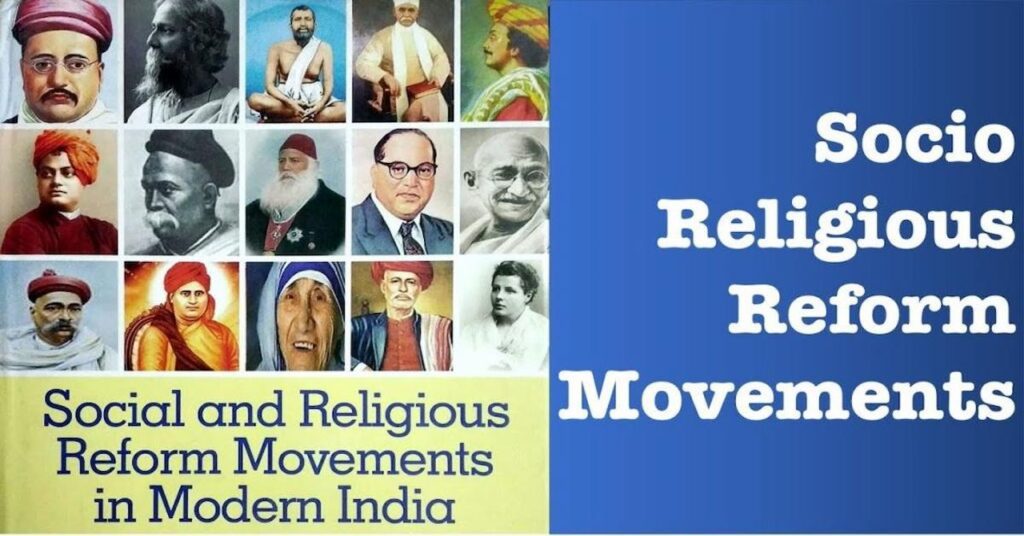Reform Movements in India
The reform movement in India is the movement that influenced all sections of society. India saw rapid development in the fields of literature, science, and art. This enlightened and educated class played a very crucial and constructive role in the progress of India. it was during the reform movements in India that the opposition to the caste system spread throughout India and among all sections of the society.
The social reform movement in India is a kind of social movement that aims to make gradual changes or changes in certain aspects of society, rather than rapid or fundamental changes. social reform also means that a group of people with a common ideology try together to achieve certain general goals. Certain social and political changes brought in society for betterment through collective action are generally called social reform movements in India. social reform movements in India also belong to the realm of welfare. the concept of social reform movements in India to Educate young people for success in society.


RAJA RAM MOHAN ROY
Raja Ram Mohan Roy was one of the earlier reformers influenced by Western ideas to initiate reforms. He was opposed to meaningless religious ceremonies and all forms of social custom. Ram Mohan Roy advocated the rights of widows to remarry and was deeply concerned with the prevailing customs of sati, child marriage, and polygamy. Ram Mohan Roy introduced the Brahmo Samaj in 1828. He opened a temple in Calcutta. The Brahmo Samaj remained limited to intellectuals and enlightened Bengalis.
MAHARISHI DEBENDRANATH TAGORE
Carrying on the work was Debandranath Tagore, Rabindranath Tagore’s father, who carried on the work. He laid down the four articles of faith. The universe was created by a single supreme being. He alone is the God of truth, goodness, and power Our salvation depends on belief in him and his worship. Belief includes loving him and doing his will.
SEN KESAB CHANDRA
Kesab Chandra Sen, who joined the movement in 1857, was greatly influenced by Christianity, believing in its spirit. A split occurred in the ranks of Brahmo Samaj and they founded a new organization, which came to be known as Adi Brahmo Samaj.
VIDYASAGAR, ISHWAR CHANDRA
The outstanding reformer in Bengal was Vidyasagar. He argued that the Hindu scriptures were progressive. He provided evidence from scriptures that there was no sanction for widows or a prohibition on the remarriage of widows. The motion led using Vidyasagar resulted in the Widows’ Remarriage Reform Act of 1856.
PRARTHANA SAMAJ
A movement was founded in Bombay in 1867, founded by Dr. Atma Ram Panturang. The two distinguished members of this samaj were R.C. Bhandarkar and Justice Mahadev Govind Ranade. They devoted themselves to inter-caste dining, inter-caste marriage, widow remarriage, and the improvement of women and depressed classes.
ISLAMIC REFORMS
After the suppression of the great revolt of 1857, Indian Muslims looked to Western culture with suspicion. The community feared Western education, culture, and ideas would endanger their religion. Only a small section of Muslim reform movements in India accepted the new avenue for modern education. Muslim reform movements in India stand for solidarity with the courageous women speaking out about the alleged abuse of power including rape by Islamic leader.
Sir Sayyid Ahmed Khan
Sayyid Ahmed Khan was born in Delhi into a noble Muslim family. He thought the lack of education, especially modern education, had harmed the Muslims and kept them backward. He advised the Muslims to take an English education and to concentrate on it.
ALIGARH MOVEMENT
Over successive generations, the Aligarh movement produced a vast body of intelligence that played an important role in public life.
DEOBAND MOVEMENT
The Deoband was a revivalist movement organized by the orthodox Muslim Ulema with the twin objectives of propagating the pure teaching of the Qur’an and Hadith. The Ulema, under the leadership of Muhammad Qasim Wanotavi and Rashid Ahmad Gangotri, founded the school at Deoband in the Saharanpur district of UP in 1866. The Deoband school did not prepare its students for government jobs but for the preaching of the Islamic faith.
PARSI REFORM MOVEMENT
In the middle of the nineteenth century, the reform activities of the educated Parsis began in Mumbai. Furdunji Naoroji founded the Rahnumai Mazdayasnan Sabha in 1851. The leaders of this Sabha criticized elaborate ceremonies of betrothals, marriages, and funerals. They opposed both infant marriage and the use of astrology.
CONCLUSION
The socio-religious reform movements strive to sustain social justice in India destroy the social evils and promote women’s education in society.
